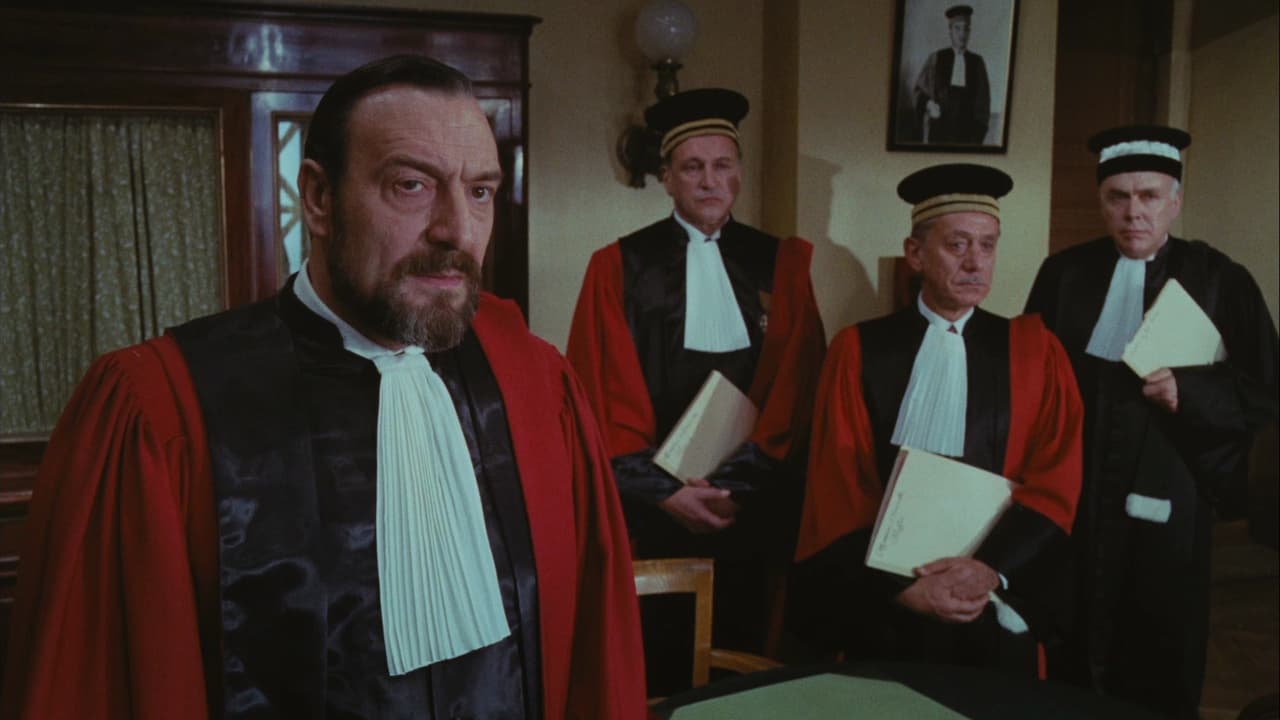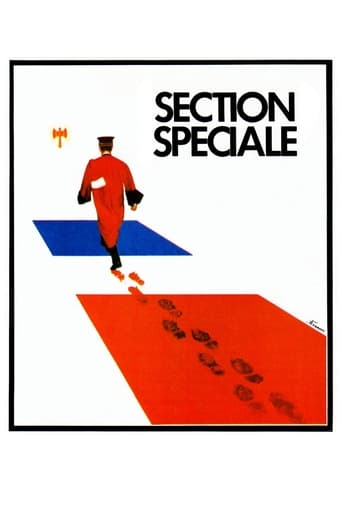

What makes it different from others?
... View MoreTruly Dreadful Film
... View MoreAbsolutely amazing
... View MoreI think this is a new genre that they're all sort of working their way through it and haven't got all the kinks worked out yet but it's a genre that works for me.
... View MoreCosta-Gavras was never my idea of a great director, and here he performs a tiresome retelling of one of the lesser-known atrocities of the war: the trial of six men held in French prison for minor crimes who have been retroactively charged with capital offenses. (spoiler) The Germans demanded it, the Pétain government eagerly acquiesced and it was left to the special tribunal to try the men and sentence them to death. The first 45 minutes are really dull; the scriptwriters must have realized that few people would know or understand the subtleties of French politics and justice, so we get characters speaking great amounts of expository dialog. We have to wait until the tribunal is finally selected and the cases are presented to see the drama begin to unfold.The flower of the acting profession is here: Louis Seigner, Pierre Dux, Jean Champion, Julien Bertheau, Michel Lonsdale and others, and they all do a good job. Yves Robert and Bruno Cremer as two of the condemned men are impressive. The DVD I saw had no subtitles for the scene of the German officers at dinner, which tells me Pathé Métropole must be on a tight budget.
... View MoreCosta Gavras' "Special Section" takes place during the German occupation of France. A German officer has been killed by a group of Marxist "freedom fighters", an act which provokes the Nazis into offering an ultimatum to France's compliant Vichy government: execute six Frenchmen or else.Anxious to placate the Nazis (and save their own necks), the Vichy government, working through France's Justice Department, sets up a "special section" comprising a small group of ambitious and amoral judges. They're ruthless careerists with no qualms about killing their own countrymen. And so new laws are passed and several innocent men are selected for execution. End result: Frenchmen dying at the hands of Frenchmen. Sensing an opportunity, France then uses this "Nazi ultimatum" as a pretext to expunge others who previously stood up against the state.Like Gavras' later "Amen", "Special Section" attempts to map WW2's vast web of appeasements, double standards, double binds, blind-eyes and complicitous dealings. It is not only in this way that the Holocaust was itself "mobilized" across Europe, but how France, and other nations, became brothers with those whom they opposed. Indeed, Nazi Germany was intimately bound with Western (France, American, British) Imperialism.Gavras maintains a breezy, fast pace throughout "Special Section", but his film too heavily oozes moral indignation, is filled with stereotypes, caricatures and walking mouthpieces, and too often substitutes nuance for obviousness. The film neither shock nor haunts, though Gavaras' somewhat detached tone – he chronicles events like a documentarian – does at times lend the film a machine-like, inexorable quality. Among the cast, Michael Lonsdale, who found himself in many of the better political thrillers of the 60s and 70s, shines.7.9/10 – Worth one viewing. See "The Sorrow and the Pity".
... View MoreUnlike "Z" and "L'Aveu" ,"Section Speciale" was not a big success when it was theatrically released ."Z" took place in Greece and "L"Aveu" behind the iron curtain."Section Spéciale" takes place in France and it is no easy to clean your own backyard .Coming after "Le Chagrin Et La Pitié" and "Lacombe Lucien" which both showed the other side of the French attitude towards their occupying forces (till the seventies,most of the movies dealt with the French resistance from "Le Père Tranquille" to "L'Armée Des Ombres" ),Costa-Gavras showed how the French used the law to commit injustice .And these French who sentenced their compatriots to death were not troubled after the Liberation (whereas others who did not kill anybody were).Main objection:"if we had not sacrificed these ones,a hundred of French people would have been shot..."Although Costa-Gavras made his movie accessible to everyone (story telling has always been his forte,even in his American career),he did not try to sweeten the screenplay with love affairs or melodrama (the past of one of the victims,played by Yves Robert ,is almost treated with nonchalance and casualness).Although there is no superstar here (nobody like Yves Montand) most of the actors,even in small parts,were widely known by the French audience of the seventies: his producer,Jacques Perrin,had been the rebellious journalist in "Z" and he portrays the only lawyer who really "plays".But Costa-Gavras's best idea for the casting is the choice of Claude Pieplu as the presiding judge: his high-pitched voice -it's necessary to see the movie in French with subtitles- works wonders,so to speak,and I can't see no other French actor in this part.This man was so talented he would convince you that all he did was for the sake of his homeland.
... View MoreIn another brilliant collaboration between director Costa-Gavras and screenwriter Jorge Semprún (Z, State of Siege), we journey Nazi-occupied France where young resistance members, living up to the French ideals of freedom, and in stark opposition to Marshall Pétain and his ministers' eagerness to please the invaders, decide to kill German soldiers. This event leads the Vichy government to institute a special court of law to trial and sentence to death communists, Jews, anarchists and other undesirables on spurious charges, just to appease the Germans, who threaten to kill 50 eminent Frenchmen - like judges and lawyers.The movie chronicles how the government, the minister of justice, his judges and everyone else involved in the judicial system, change the constitution, pass special laws, and choose the scapegoats. Throughout we also see a few voices rising against the injustice, but they're quickly silenced or ignored. In the end these exceptional courts - the Special Sections of the title - are carried out with almost complete unanimity amongst the judicial class.This is what Costa-Gavras wishes to show and condemn, the conformity and complicity of these people with their invaders, the execution of innocent people for political reasons, and the use and abuse of the law to hide injustice. The movie is shot very surgically, almost like a documentary, with some dramatic licenses, of course. Costa-Gavras can't be accused of not knowing how to mix heavy subjects with mainstream storytelling.A deviation from his his fast-paced thrillers like Z and State of Siege, this movie is more of a drama, and an exceptionally good one, deserving of more popularity amongst cinema lovers. It's interesting, informative and possibly mind-changing.
... View More